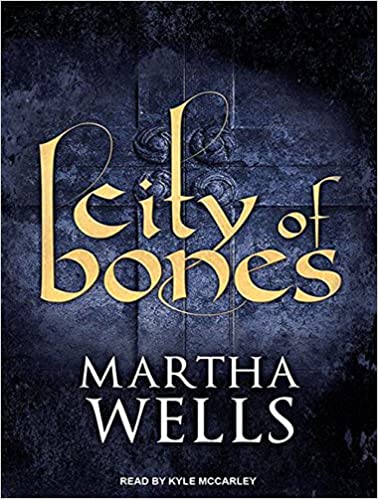City of Bones is a rather niche, otherwise forgotten book from 1995 that has enjoyed some renewed interest as a result of the amazing Murderbot book series by the same author, Martha Wells. It is not to be confused with another book of the same name by a different author.
It can be rather difficult to describe this book. While it involves some magic, it is only a little and in such a way it is hard to see it as a traditional fantasy. There are whiffs of post-apocalyptic dystopia as well, but again, it doesn’t really fit that mold either. There are even some steampunk elements – steam wagons and a passing mention of airships. If you were to make it into the movie, it would end up something like a cross between Indiana Jones and Dune, maybe also with a bit of The Mummy (1999).
The beginning is a bit slow, the world building is heavy at the beginning, with interesting but flawed characters. As it grows, so does our knowledge of these somewhat enigmatic characters. Said characters fill the passage of time largely by engaging in urban theft and intrigue and street and fist-fighting – entertaining but nothing like the ballistic fights of Murderbot.
What really stands out here is the literal depth of the world building: the tiers of the city and the levels of the Waste. Also the gardens, mosaics, walls, and significance of water and fountains. She has done a wonderful job of capturing a slice of the ancient Near East or drier parts of the Mediterranean: I almost feel like I could see this set in Tunisia with its waste and ruins, mixed with the spirits and powers that to the ancients truly felt to have existed. It is essentially a modern take on what could be a truly ancient tale.
One thing I appreciate is how themes of class, race, gender (etc, etc) are captured and portrayed. This isn’t like some works where these social justice themes are forced brutally upon the reader. In this story, they add simply add color and complications just as they do in real life.
The tone in particular aligns with what I feel out of many ancient works: dark but not desperate. The world is rougher place, and that makes for a rougher story. It is a fantastical, amazing world she has written, but over everything she has also cast a layer of dust.
I think that ending is ultimately why the story was not a greater success. While the conclusion is happy, it is no cheerful fairy tale with a grand celebration. The ending is, well, rather as it sensibly would be, realistic and pragmatic. Martha Wells seemingly pulls in the Elector to perform a deus ex machine in the denouement, ready to tie up everything, showering wealth and blessing love on all, and then very deliberately she throws that opportunity away. This ending and the entire attitude of the main character seem intended all to convey one clear message: enjoy this world, but don’t delude yourself about what the reality really is.

